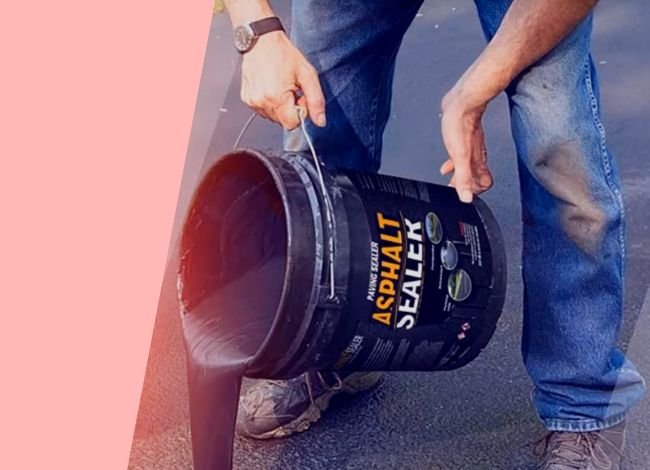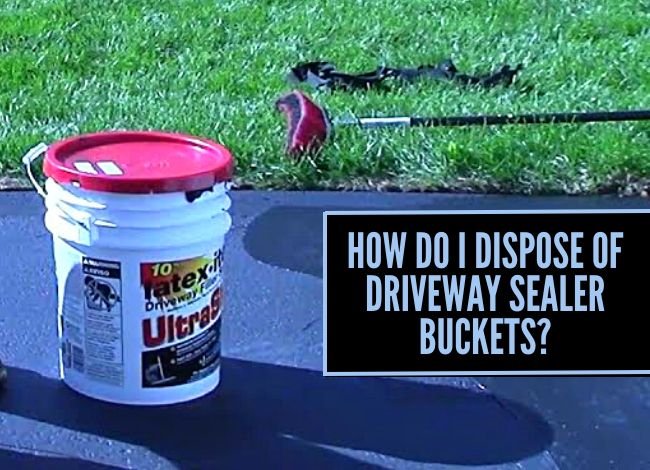Last Updated on May 12, 2025
Disposing of an empty driveway sealer bucket can be confusing for many homeowners. While some people toss it in the trash without a second thought, others consider recycling or reusing it for household tasks. But what is the safest and most environmentally responsible method?
Should You Reuse or Recycle the Driveway Sealer Bucket?
In most cases, reusing an empty driveway sealer bucket is not recommended. After use, the inside of the bucket is often coated with residual sealant, which can be sticky, toxic, or even hazardous. Reusing such a bucket for household activities like storing tools, food items, or gardening materials poses serious health and environmental risks. The remaining chemicals can contaminate anything stored inside and may be harmful to your skin or lungs.
Can You Throw the Bucket in the Trash?
While it may seem like the easiest option, throwing the bucket in your regular trash is not ideal, especially if it contains any leftover sealer. Driveway sealers often contain chemicals that are considered hazardous waste. Simply dumping the bucket in your household trash can lead to improper disposal and potential environmental harm.
Best Practice: Use a Hazardous Waste Collection Service
The most eco-friendly and responsible way to dispose of an empty sealer bucket is to hand it over to your local hazardous waste collection facility. These services are equipped to safely handle chemical residues and ensure that they don’t harm the environment.
- Check with your local waste management authority for collection schedules.
- Store the bucket in a safe place until the hazardous waste pickup day.
- Do not rinse the bucket out into drains or onto your lawn, as it may contaminate water sources.
Why You Shouldn’t Leave It Outdoors
Plastic containers left outside can degrade under sunlight, causing harmful chemicals to seep into the ground. Moreover, leaving an empty sealer bucket exposed to the elements contributes to plastic pollution, which can harm animals and contaminate soil and water.
Is Asphalt Sealer a Hazardous Material?
Yes, asphalt sealer is considered a hazardous material. It often contains chemicals that can cause serious health issues, including skin irritation, respiratory problems, and even cancer. One of the primary harmful substances found in some asphalt sealers is polycyclic aromatic hydrocarbons (PAHs)—known carcinogens linked to long-term health risks. Due to the potential dangers, it’s important to handle and dispose of asphalt sealer responsibly.
What Does “Hazardous Waste” Mean?
Hazardous waste refers to any material that poses a significant risk to human health, animals, and the environment. This includes substances that are toxic, flammable, corrosive, or reactive. Improper disposal of such waste can lead to pollution and exposure to harmful chemicals.
To manage this risk, many communities organize household hazardous waste collection events. These events provide a safe way for residents to dispose of materials like asphalt sealer, old paint, and other chemicals. Participating in these programs not only ensures legal compliance but also protects your family, pets, and local ecosystem.
Can I Throw the Driveway Sealer Bucket in a Recycling Bin?
No, you should not place the bucket of driveway sealer in a recycling bin. The plastic container is typically contaminated with chemical residue, making it unsuitable for standard recycling. Even if the bucket appears empty, remnants of sealer can still pose environmental hazards.
Instead, it’s recommended to:
- Let any leftover sealer harden completely by leaving the lid off in a well-ventilated area, out of children’s reach.
- Once dried, dispose of the solidified material and the bucket in the regular trash, unless your local hazardous waste program offers specific disposal instructions.
Final Thoughts
Proper disposal of asphalt sealer and its containers is crucial for maintaining a safe and healthy environment. Avoid taking unnecessary risks by treating these materials as hazardous waste. Utilize local hazardous waste collection events to responsibly discard leftover sealer and buckets. Not only will you protect your health, but you’ll also contribute to a cleaner and safer community.


Where in the Dover DE area can I dispose of asphalt filler/sealer containers?